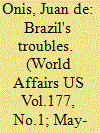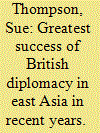|
|
|
Sort Order |
|
|
|
Items / Page
|
|
|
|
|
|
|
| Srl | Item |
| 1 |
ID:
130244


|
|
|
|
|
| Publication |
2014.
|
| Summary/Abstract |
With the extravaganza of the winter Olympic Games in Sochi over, the spotlight now turns to Brazil, the host of the FIFA World Cup championship in June. This tournament, the most widely viewed of global sports spectacles, is held every four years and involves thirty-two national teams, each of which has survived two years of regional competitions in Europe, Africa, Asia, and the Americas to reach the final play-offs. Starting on June 12th, sixty-four games will be played in four weeks, in stadiums all over Brazil, until the winner emerges in a final match on July 13th at the Maracanã, Rio de Janeiro's world-famous arena. Three million foreign fans are expected to visit Brazil, and billions of television viewers worldwide will watch the games. When the World Cup was awarded to Brazil in 2007-part of a remarkable parlay that included the award of the 2016 Summer Olympics to Rio as well-the country's economy was starting to boom as part of the BRIC upsurge that seemed ready to shake up international finance. The event was political from the onset, its significance potentially going well beyond the results on the playing fields where Brazil has won the world championship a record five times, a source of great national pride. But despite initial euphoria over being chosen to host the World Cup, Brazil is now experiencing doubts over whether it can pull off the event and second thoughts about the upsurge of influence on the international scene it was supposed to symbolize. The fervid devotion of Brazilians to soccer has made this country the Land of Football (as well as samba and Carnaval). Some non-Brazilian sports commentators have been baffled, therefore, by protest signs saying, "No to the Cup." But Brazil today is not just a land of football, it is also a land of public protests against corruption, heavy taxes, and deplorable public education and health services, cities with chaotic urban transport, markets with inflated consumer prices, and a dysfunctional political system that is manipulated by an elite for personal benefit.
|
|
|
|
|
|
|
|
|
|
|
|
|
|
|
|
| 2 |
ID:
132414


|
|
|
|
|
| Publication |
2014.
|
| Summary/Abstract |
Arthur de la Mare, an under-secretary of state at the British Foreign Office, wrote in 1967 that the ending of the Malaysia-Indonesia Confrontation of 1963-1966 was "the greatest success of British diplomacy in East Asia in recent years." However, historians generally believe British influence in the process to end this conflict was extremely limited, as it has been widely accepted that this conflict ended through bilateral negotiations between Jakarta and Kuala Lumpur. On one level, this view is accurate, but "Confrontation" took months to end and, during this process, British, American, and Malaysian officials hoped to encourage a change in leadership in Jakarta and an eventual end to the conflict. Confrontation was an anti-colonial and a regional dispute greatly affected by the Cold War environment in Southeast Asia and, therefore, not immune from international events or actors, especially the final phase of the conflict
|
|
|
|
|
|
|
|
|
|
|
|
|
|
|
|
| 3 |
ID:
131335


|
|
|
|
|
| Publication |
2014.
|
| Summary/Abstract |
This essay considers the relationship between the Japanese Fluxus-affiliated collective Hi Red Center's performance event Shelter Plan (1964) and Frank Lloyd Wright's Imperial Hotel, in which the event was staged. In the year of the Tokyo Olympics and the heralding of the end of the post-war era for Japan, Shelter Plan, which involved the production of tailor-made bomb shelters, rejected the ideological function of the Tokyo Olympics, and the increasingly repressive political climate that accompanied it. I argue that Shelter Plan needs to be understood as a site-specific response to one of Frank Lloyd Wright's major works. As successor to a lineage of hotels designed to house Western visitors in Japan, and imagined by Wright as an opportunity to bring the Japanese 'off their knees' and into modernity, the Imperial Hotel was a highly charged site for addressing the politics of intercultural exchange between Japan and the West.
|
|
|
|
|
|
|
|
|
|
|
|
|
|
|
|
| 4 |
ID:
149820


|
|
|
|
|
| Summary/Abstract |
IHS Jane's examines significant activity by militant groups during October-November, as activists and supporters reacted to international events. Excerpts are sourced from a range of social media platforms and analysed for their implications.
|
|
|
|
|
|
|
|
|
|
|
|
|
|
|
|
| 5 |
ID:
126541


|
|
|
|
|
| Publication |
2013.
|
| Summary/Abstract |
Many have noted the rise of the global in academic and popular discourse. We ask how this global frame of reference has been incorporated into secondary social science textbooks, a realm traditionally dominated by nationalist discourse. Utilizing a data set from more than 500 secondary school textbooks from around the world, spanning 1970-2008, we describe the incorporation of mentions of globalization and global citizenship into textbooks over time and then use a multilevel model to determine the textbook and country-level variables associated with mentions of each. We find that globalization and global citizenship are both predicted by the textbook content's reflection of the external world, including international events and mentions of human rights. However, no cross-national economic or political differences systematically predict incorporation of these topics. We argue that mentions of globalization and global citizenship in textbooks are two manifestations of a world culture that increasingly emphasizes interconnectedness in postnational society
|
|
|
|
|
|
|
|
|
|
|
|
|
|
|
|
|
|
|
|
|